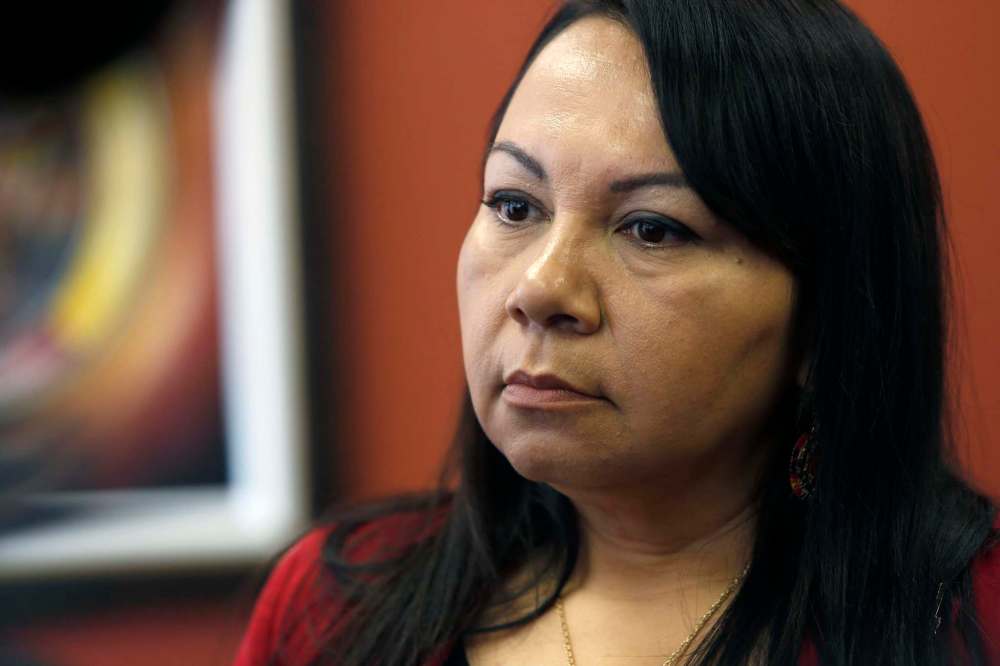MKO chief makes health-care inroads with premier
Sheila North Wilson said Brian Pallister receptive to ideas
Advertisement
Read this article for free:
or
Already have an account? Log in here »
To continue reading, please subscribe:
Monthly Digital Subscription
$1 per week for 24 weeks*
- Enjoy unlimited reading on winnipegfreepress.com
- Read the E-Edition, our digital replica newspaper
- Access News Break, our award-winning app
- Play interactive puzzles
*Billed as $4.00 plus GST every four weeks. After 24 weeks, price increases to the regular rate of $19.00 plus GST every four weeks. Offer available to new and qualified returning subscribers only. Cancel any time.
Monthly Digital Subscription
$4.75/week*
- Enjoy unlimited reading on winnipegfreepress.com
- Read the E-Edition, our digital replica newspaper
- Access News Break, our award-winning app
- Play interactive puzzles
*Billed as $19 plus GST every four weeks. Cancel any time.
To continue reading, please subscribe:
Add Free Press access to your Brandon Sun subscription for only an additional
$1 for the first 4 weeks*
*Your next subscription payment will increase by $1.00 and you will be charged $16.99 plus GST for four weeks. After four weeks, your payment will increase to $23.99 plus GST every four weeks.
Read unlimited articles for free today:
or
Already have an account? Log in here »
Hey there, time traveller!
This article was published 27/07/2017 (3005 days ago), so information in it may no longer be current.
OTTAWA — The chief representing Manitoba’s northern First Nations says she’s making progress in giving Indigenous groups more power over health care, days after declaring her region’s suicide-crisis teams were overworked.
Earlier this week, Sheila North Wilson, chief of the Manitoba Keewatinowi Okimakanak, said the province was dragging its feet in helping her group negotiate a mental-health framework with Ottawa.
Since last October, the MKO, which represents 30 First Nations in the province’s north, has pushed for what it calls “health transformation,” which involves giving groups more power over health while sorting out federal and provincial responsibilities.

Generally, the federal government pays for on-reserve health care, often through nurses that give advice and basic treatments, but fly patients down to cities for more complex treatment.
That can get complicated in situations like an outbreak of suicide cases, as federally-paid nurses working alongside band-funded crisis workers, and sometimes fly patients to province-funded hospitals.
Experts say that can prompt a mismatch of resources, like too many nurses and not enough councillors, or jurisdictional squabbles that delay care for Indigenous patients.
On Monday, an Ontario group similar to the MKO, the Nishnawbe Aski Nation, signed an agreement with Federal Health Minister Jane Philpott and the Ontario government, aimed at tackling these hurdles.
On Monday, North Wilson said she wanted a similar charter for the MKO, but blamed the province for a lack of progress, having just one meeting since pitching the idea nine months prior. But that seems to be changing.
North Wilson met Thursday with Premier Brian Pallister, who she said seemed receptive to ideas such as flying more patients to the Churchill Health Centre instead of hospitals in Winnipeg. She said the premier seemed receptive, and asked for her group’s detailed plan.
“I relayed to him that it would be good if we had the province on board, so we can leverage what each of us have, and to move forward as good neighbours,” said North Wilson.
“I remain hopeful that we’re not going to have for wait for [the province],” North Wilson said, but added she’s still willing to start direct talks with the federal government if the province stalls.
The former minister in charge of overseeing federal Indigenous issues says MKO can only make progress with the Manitoba government’s help.
Kenora MP Bob Nault says that since he served as Minister of Indian Affairs in 2003, First Nations groups have continued to face “jurisdictional football” in navigating health care, especially for mental health.
“Everybody keeps kicking it back and forth, which is causing us nothing but failure in delivering quality health care,” he said.
“We’re not talking about just money, we’re talking about co-ordination of health care practices, doctors [and] nurses.”
The Liberal MP says co-ordinating mental health care “brings us into modern society.” He’s exasperated Canada lacks a coherent response to crises like suicide outbreaks.
“My frustration is that we’ve had this conversation at the political level many times before,” Nault says. “We don’t have preventative health-care systems in the north; it’s all reactive to crises.”
He also says First Nations control over health care is “a heck of a lot better than what we’re doing now,” where Ottawa leads decisions on the north. “The solutions lie in the community.”
Meanwhile, the province is disputing MKO’s comments to the Free Press earlier this week, that Manitoba’s standoff on federal health funding is impeding a possible framework for Indigenous mental health.
Manitoba is the only province to not sign Ottawa’s health accord on funding for mental health and home care (but it will still receive federal transfers for hospitals and doctors). Federal and provincial officials say the two aren’t related, and that any charter with MKO would take months to complete, and Manitoba’s dispute would probably be settled by then.
dylan.robertson@freepress.mb.ca

